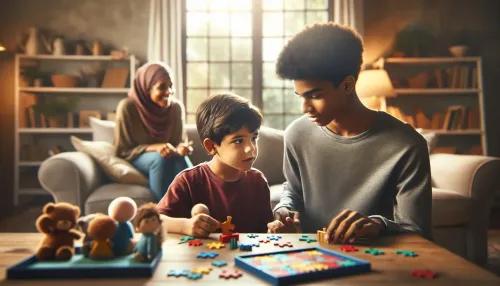
Sustainable Living with Autism: Eco-friendly Practices Tailored for Autistic Families

In the pursuit of a sustainable lifestyle, families with autistic children can explore creative eco-friendly practices that not only benefit the environment but also cater to the unique needs of their children. By integrating sensory tasks, therapeutic activities, and conscious consumption into everyday life, families can nurture a greener, more inclusive environment for their loved ones with autism. Let's delve into some practical and uplifting strategies that promote sustainability within the context of autism.
Upcycling Fun: Engaging Projects that Combine Sustainability with Sensory Tasks
Upcycling offers an ideal platform for engaging children with autism in sensory-rich activities while promoting environmental consciousness. Simple projects such as creating sensory boards from discarded materials or repurposing household items for interactive sensory play not only stimulate the senses but also encourage sustainable habits. By incorporating tactile experiences into upcycling projects, children can develop sensory and fine motor skills while contributing to eco-friendly initiatives.
The HorizonsMind community embraces the concept of upcycling as an innovative and enjoyable way to promote sustainable living within an autism-friendly context. Encouraging families to embark on upcycling endeavors fosters an environment that supports both sensory engagement and environmental mindfulness.
Green Thumbs Up: Gardening as a Therapeutic Practice for Autistic Individuals
Gardening serves as a therapeutic outlet for individuals with autism, offering a myriad of sensory experiences and nurturing opportunities. The tactile stimulation provided by soil, seeds, and plants can be profoundly calming for autistic children, promoting relaxation and stress reduction. Engaging in gardening activities not only cultivates a greater appreciation for nature but also instills valuable life skills related to responsibility and care.
As we advocate for the transformative power of gardening within the autistic community, recognizing it as an impactful avenue for sensory exploration, skill development, and emotional well-being. By cultivating sustainable practices through gardening, families can create an immersive and enriching environment that aligns with both eco-friendly principles and the specific needs of individuals with autism.
Conscious Consumption: Making Smart, Sustainable Lifestyle Choices as a Family
Conscious consumption involves making informed decisions that prioritize sustainability and minimize environmental impact. For families raising autistic children, conscious consumption extends beyond environmental considerations to encompass products and practices that align with their child's sensory sensitivities and behavioral patterns. By opting for eco-friendly alternatives that accommodate their child's needs, families can uphold sustainable living while catering to the unique requirements of autism.
Emphasizing the importance of conscious consumption as a gateway to sustainable living tailored for autistic families. Through guidance on selecting sensory-friendly products and integrating sustainable alternatives into daily routines, we empower families to make mindful choices that benefit both their children and the planet.
Zero Waste Journey: Practical Tips for Reducing Waste with an Autism-Friendly Approach
Embarking on a zero waste journey presents an opportunity to minimize environmental impact while incorporating autism-friendly strategies. Simple yet impactful steps such as reducing single-use plastics, repurposing household items, and implementing sensory-engaging recycling initiatives contribute to both environmental sustainability and sensory-rich experiences for autistic individuals. By integrating waste-reduction practices tailored to accommodate sensory sensitivities, families can embrace a holistic approach to sustainability.
As we advocate for zero waste initiatives that embrace inclusivity and environmental responsibility within the realm of autism. By sharing practical tips on reducing waste through sensory-conscious methods, we support families in cultivating a zero waste lifestyle that harmonizes sustainability with the specific needs of their loved ones with autism.
Ethical Eating Made Easy: Introducing Autism-Friendly Practices into Sustainable Diet Choices
Sustainable diet choices can be seamlessly integrated with autism-friendly practices to promote healthy eating habits tailored for individuals with autism. Emphasizing whole foods, minimizing food waste, and incorporating sensory-rich meal experiences contribute to both nutritional well-being and environmental sustainability. By nurturing an ethos of conscious eating within the context of autism, families can cultivate a sustainable approach to nourishment that respects both individual needs and ecological balance.
HorizonsMind champions ethical eating as a means of fostering sustainable dietary practices adapted to the preferences and sensitivities of individuals with autism. By advocating for inclusive approaches to sustainable nutrition, we guide families in embracing environmentally mindful food choices that complement the diverse needs of autistic individuals.
Energy Conscious Living: Simple Adjustments to Conserve Energy in an Autism-Friendly Household
Energy conservation initiatives align seamlessly with the principles of sustainability while accommodating the unique sensory sensitivities of autistic individuals. Implementing energy-efficient practices such as gentle lighting solutions, regulating noise levels, and optimizing thermal comfort enhances the overall well-being of individuals with autism while promoting ecological stewardship. By prioritizing energy-conscious adjustments tailored to the specific requirements of autism, families can create a harmonious living environment that embodies sustainability in action.
At HorizonsMind, we advocate for energy-conscious living as a transformative approach that integrates sustainability with sensitivity to enhance the everyday experiences of individuals with autism. By offering actionable guidance on implementing energy-saving measures within an autism-friendly framework, we empower families to cultivate a living space that embodies sustainable values while nurturing the well-being of their autistic loved ones.
In line with our commitment to providing valuable resources for sustainable living within the autism community, these innovative strategies offer meaningful opportunities to promote eco-friendly practices tailored specifically for autistic families. Through a fusion of imaginative engagement, therapeutic endeavors, and mindful choices, families can embark on a journey towards sustainable living that celebrates inclusivity and environmental stewardship.


